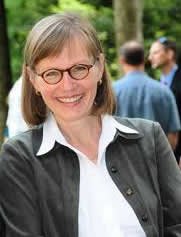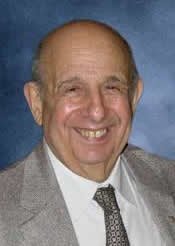German author and scholar present joint reading on Holocaust memories in literature, March 6 at SU
Susanna Piontek and Guy Stern will examine translation and fictionalization of actual memories

The literary representation of Holocaust memories will be the subject of a presentation by the husband-and-wife team of Susanna Piontek and Guy Stern in Syracuse University’s College of Arts and Sciences.
The program, “Remembering the Holocaust Through Fiction and Facts,” is on Wednesday, March 6, at 5:30 p.m. in the Peter Graham Scholarly Commons of Bird Library. The event is free and open to the public. For more information, contact Karina von Tippelskirch at 315-443-5383 or kvontipp@syr.edu.
Described as a reading interwoven with conversations about Piontek’s and Stern’s work, the program will address issues of translation and fictionalization of actual memories.
“It will mark the culmination of the couple’s visit to campus,” says von Tippelskirch, assistant professor of German and coordinator of the German language program in the Department of Languages, Literatures, and Linguistics (LLL). “Guy Stern is a leading expert of German Jewish and exile literature and, as an emigrant, has dedicated his life to teaching and scholarly research of these subjects. In turn, Susanna Piontek has always been interested in Jewish tradition, literature, music, and history. Many of her stories deal with problems of Jewish life in post-war Germany and Israel.”
During the program, Piontek will read from her English-language short-story collection, “Have We Possibly Met Before?” (Culicidae Press, 2012).
Born in Poland, Piontek immigrated to Germany, before settling permanently in the United States as a freelance writer. “Have We Possibly Met Before?” originated in 2005 as a collection of stories published in German. Stern, who translated the book and wrote the preface, calls Piontek’s literary perspective “refreshingly realistic.”
“With unflinching exactness, she describes everyday life situations we all know very well,” he writes. “In a certain way, we walk into her stories like guests into a living room, but only to realize that things are not as they seem, and that we will never get what we want.”
Piontek earned a master’s degree from Bochum University (Germany), where she studied language pedagogy, history, and American studies and then trained in broadcast editing. While working at a radio station, Piontek began jotting down poems and short stories, which have been published and anthologized throughout North America and Europe.
The program, “Remembering the Holocaust Through Fiction and Facts,” is on Wednesday, March 6, at 5:30 p.m. in the Peter Graham Scholarly Commons of Bird Library. The event is free and open to the public. For more information, contact Karina von Tippelskirch at 315-443-5383 or kvontipp@syr.edu.
Described as a reading interwoven with conversations about Piontek’s and Stern’s work, the program will address issues of translation and fictionalization of actual memories.
“It will mark the culmination of the couple’s visit to campus,” says von Tippelskirch, assistant professor of German and coordinator of the German language program in the Department of Languages, Literatures, and Linguistics (LLL). “Guy Stern is a leading expert of German Jewish and exile literature and, as an emigrant, has dedicated his life to teaching and scholarly research of these subjects. In turn, Susanna Piontek has always been interested in Jewish tradition, literature, music, and history. Many of her stories deal with problems of Jewish life in post-war Germany and Israel.”
During the program, Piontek will read from her English-language short-story collection, “Have We Possibly Met Before?” (Culicidae Press, 2012).
Born in Poland, Piontek immigrated to Germany, before settling permanently in the United States as a freelance writer. “Have We Possibly Met Before?” originated in 2005 as a collection of stories published in German. Stern, who translated the book and wrote the preface, calls Piontek’s literary perspective “refreshingly realistic.”
“With unflinching exactness, she describes everyday life situations we all know very well,” he writes. “In a certain way, we walk into her stories like guests into a living room, but only to realize that things are not as they seem, and that we will never get what we want.”
Piontek earned a master’s degree from Bochum University (Germany), where she studied language pedagogy, history, and American studies and then trained in broadcast editing. While working at a radio station, Piontek began jotting down poems and short stories, which have been published and anthologized throughout North America and Europe.

Stern is director of The Harry and Wanda Zekelman International Institute of the Righteous—the nation’s first freestanding museum dedicated to the memory of the Holocaust—in Farmington Hills, Michigan. He also co-founded the country's first Lessing Society at the University of Cincinnati, serving as society president from 1975-77. Stern has written and edited numerous books on German literary history, including “Fielding, Wieland, Goethe, and the Rise of the Novel” (Peter Lang GmbH, 2004); “Literature and Culture in Exile” (Dresden University Press 1998); and “War, Weimar, and Literature: The Story of the Neue Merkur, 1914-25” (Penn State University Press, 1971).
Born into an assimilated Jewish family in Germany, Stern escaped to the United States in 1937. (He later found out his parents were murdered at the Treblinka extermination camp in Poland, after being deported to the Warsaw Ghetto.) Following World War II, Stern embarked on an illustrious academic career that included positions at Wayne State and Denison universities and at the universities of Maryland and Cincinnati. Stern is the recipient of numerous honors and awards, including the Grand Cross of the Order of Merit of the Federal Republic of Germany and the Goethe Medal.
“Remembering the Holocaust” is organized and presented by the German language program, with support from LLL; The SU Humanities Center; the Judaic Studies Program; the School of Education’s Regional Holocaust and Genocide Initiative: “Resistance, Resilience, and Responsibility”; and the German Consulate General in New York.
LLL is the largest department in The College's humanities division, serving more than 6,000 graduates and undergraduates a year. The department provides instruction in 21 languages and offers nine bachelor’s and three master’s degree programs. More information is at lang.syr.edu.
Born into an assimilated Jewish family in Germany, Stern escaped to the United States in 1937. (He later found out his parents were murdered at the Treblinka extermination camp in Poland, after being deported to the Warsaw Ghetto.) Following World War II, Stern embarked on an illustrious academic career that included positions at Wayne State and Denison universities and at the universities of Maryland and Cincinnati. Stern is the recipient of numerous honors and awards, including the Grand Cross of the Order of Merit of the Federal Republic of Germany and the Goethe Medal.
“Remembering the Holocaust” is organized and presented by the German language program, with support from LLL; The SU Humanities Center; the Judaic Studies Program; the School of Education’s Regional Holocaust and Genocide Initiative: “Resistance, Resilience, and Responsibility”; and the German Consulate General in New York.
LLL is the largest department in The College's humanities division, serving more than 6,000 graduates and undergraduates a year. The department provides instruction in 21 languages and offers nine bachelor’s and three master’s degree programs. More information is at lang.syr.edu.
Media Contact
Rob Enslin
